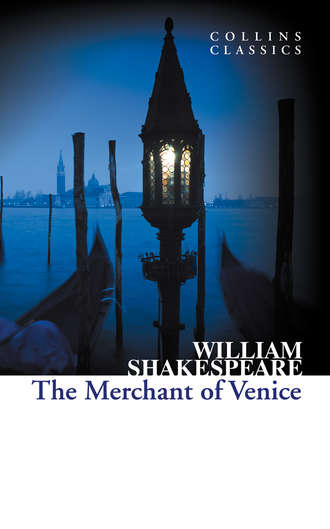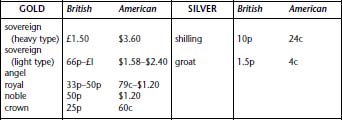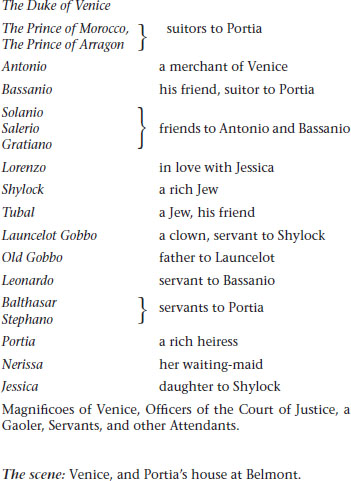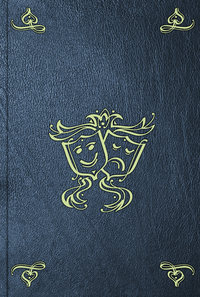
Полная версия
The Merchant of Venice
Life & Times
William Shakespeare the Playwright
There exists a curious paradox when it comes to the life of William Shakespeare. He easily has more words written about him than any other famous English writer, yet we know the least about him. This inevitably means that most of what is written about him is either fabrication or speculation. The reason why so little is known about Shakespeare is that he wasn’t a novelist or a historian or a man of letters. He was a playwright, and playwrights were considered fairly low on the social pecking order in Elizabethan society. Writing plays was about providing entertainment for the masses – the great unwashed. It was the equivalent to being a journalist for a tabloid newspaper.
In fact, we only know of Shakespeare’s work because two of his friends had the foresight to collect his plays together following his death and have them printed. The only reason they did so was apparently because they rated his talent and thought it would be a shame if his words were lost.
Consequently his body of work has ever since been assessed and reassessed as the greatest contribution to English literature. That is despite the fact that we know that different printers took it upon themselves to heavily edit the material they worked from. We also know that Elizabethan plays were worked and reworked frequently, so that they evolved over time until they were honed to perfection, which means that many different hands played their part in the active writing process. It would therefore be fair to say that any play attributed to Shakespeare is unlikely to contain a great deal of original input. Even the plots were based on well known historical events, so it would be hard to know what fragments of any Shakespeare play came from that single mind.
One might draw a comparison with the Christian bible, which remains such a compelling read because it came from the collaboration of many contributors and translators over centuries, who each adjusted the stories until they could no longer be improved. As virtually nothing is known of Shakespeare’s life and even less about his method of working, we shall never know the truth about his plays. They certainly contain some very elegant phrasing, clever plot devices and plenty of words never before seen in print, but as to whether Shakespeare invented them from a unique imagination or whether he simply took them from others around him is anyone’s guess.
The best bet seems to be that Shakespeare probably took the lead role in devising the original drafts of the plays, but was open to collaboration from any source when it came to developing them into workable scripts for effective performances. He would have had to work closely with his fellow actors in rehearsals, thereby finding out where to edit, abridge, alter, reword and so on.
In turn, similar adjustments would have occurred in his absence, so that definitive versions of his plays never really existed. In effect Shakespeare was only responsible for providing the framework of plays, upon which others took liberties over time. This wasn’t helped by the fact that the English language itself was not definitive at that time either. The consequence was that people took it upon themselves to spell words however they pleased or to completely change words and phrasing to suit their own preferences.
It is easy to see then, that Shakespeare’s plays were always going to have lives of their own, mutating and distorting in detail like Chinese whispers. The culture of creative preservation was simply not established in Elizabethan England. Creative ownership of Shakespeare’s plays was lost to him as soon as he released them into the consciousness of others. They saw nothing wrong with taking his ideas and running with them, because no one had ever suggested that one shouldn’t, and Shakespeare probably regarded his work in the same way. His plays weren’t sacrosanct works of art, they were templates for theatre folk to make their livings from, so they had every right to mould them into productions that drew in the crowds as effectively as possible. Shakespeare was like the helmsman of a sailing ship, steering the vessel but wholly reliant on the team work of his crew to arrive at the desired destination.
It seems that Shakespeare certainly had a natural gift, but the genius of his plays may be attributable to the collective efforts of Shakespeare and others. It is a rather satisfying notion to think that his plays might actually be the creative outpourings of the Elizabethan milieu in which Shakespeare immersed himself. That makes them important social documents as well as seminal works of the English language.
Money in Shakespeare’s Day
It is extremely difficult, if not impossible, to relate the value of money in our time to its value in another age and to compare prices of commodities today and in the past. Many items are simply not comparable on grounds of quality or serviceability.
There was a bewildering variety of coins in use in Elizabethan England. As nearly all English and European coins were gold or silver, they had intrinsic value apart from their official value. This meant that foreign coins circulated freely in England and were officially recognized, for example the French crown (écu) worth about 30p (72 cents), and the Spanish ducat worth about 33p (79 cents). The following table shows some of the coins mentioned by Shakespeare and their relation to one another.

A comparison of the following prices in Shakespeare’s time with the prices of the same items today will give some idea of the change in the value of money.

INTRODUCTION
In March 1814, Jane Austen took her niece to see Edmund Kean perform in The Merchant of Venice, ‘a good play for Fanny – she cannot be much affected, I think’. Perhaps she considered comedy less likely than tragedy to arouse strong passions. Times have changed. There can be no question now as to this play’s ability to kindle late-twentieth-century emotions. One recent essay brands it ‘profoundly and crudely anti-Semitic’ (Cohen, 1988).
Opposing views of The Merchant of Venice take their cue from the play’s rival centres of control, for it is a drama with two directors, each pulling strongly for different generic destinations. Shylock will have a tragic melodrama, with himself as knife-whetting villain and Antonio as victim. The latter indeed seems not unattracted to a role which allows him a momentary centrality denied him in the rest of the play. Portia, on the other hand, manoeuvres the plot and its characters inexorably towards a comic resolution.
On the structural level The Merchant of Venice unquestionably is a comedy. It contains all the standard elements: lyrical courtship, fairy-tale plot, obstructions to overcome, and a happy ending in the escapist world of Belmont. But as it proceeds, the play invites us to reassess our opinions, to revalue the very conventions on which it builds. Romance is both glamorous and superficial. We are assailed by the discrepancy between what is reported (Shylock ludicrously confusing daughter and ducats) and what is seen (Shylock grieving over memories of a ring), between expectation and disappointment (a masque is arranged only to be abandoned at the last moment). Nor can we overlook the niggling co-existence of the attractive and the repellent: Bassanio is lover and thoughtless spendthrift, Antonio respected merchant and anti-Semite, Portia intelligent heroine and calculating deceiver. But Shylock himself is the play’s sternest challenge to comic optimism.
The growing tension between light comedy and something darker is reflected in the contest between speech styles which comes to a head in the trial scene (4.1). The language of up-market Venice and Belmont draws on the earlier comedies and the Sonnets: a rhetoric of romance, chiselled metaphor and self-conscious wit. Against this Shylock articulates a slow, gritty language of almost scientific precision, fiscal prudence, and grave austerity. The Duke’s conciliatory words aim to steer him from vengeance to mercy by means of the rhetoric of public approbation and veiled threat: the world, he insists, looks for ‘remorse’, ‘human gentleness and love’, ‘an eye of pity’, ‘tender courtesy’, and ‘a gentle answer’. Othello, another outsider in Renaissance Italy, has deliberately cultivated the Venetian graces: Shylock, just as resolutely, has not. His ‘answer’ (a word he reiterates like a remorselessly prodding finger) would wither any olive branch. A wilfully ugly diction, barren of metaphor, displays his contempt for Venetian elegance: ‘rat’, ‘gaping pig’, ‘cat’, ‘bagpipe’, ‘urine’ – these are his verbal counters. And Antonio putrifies before our very eyes into ‘a weight of carrion flesh’. While the young lovers in the play happily discover both romance and riches, Shylock proves unexpectedly indifferent to financial gain. All he has is ‘a lodged hate and a certain loathing’ – inexplicable and therefore beyond the reach of rational, economic or emotional appeal. His proud Jewish separatism divorces him not only from Venetian vocabulary but ultimately from common humanity.
Such malevolence should settle our loyalties. Yet it is not as simple as that. Shylock’s exclusion from the glittering society of the play brings him strangely closer to the audience. Comedy conventionally distances so as to highlight large-scale patterns and social groupings. But Shylock, alienated by voice and profession, race and religion, stands nearer to a century equally uncertain about the values of Renaissance civilisation. And the play’s refusal to become his tragedy isolates him further: not a tragic Jew, but one despoiled, cheated, deprived of dramatic weight, robbed finally of any function in a play which proceeds calmly without him. If Antonio is not to be the lamb for the slaughter, then Shylock must be the scapegoat. There is always a cost: even comedy must expel its dissidents.
Thus the final Act retreats doggedly into a beautiful but brittle fantasy world where lovers unite, fathers relent, games conclude, and ships come home. The play which began with ‘a lady richly left’ ends aptly with the news of a deed of gift ‘from the rich Jew’. The symmetry is ironic. Reduced by the triumphant Portia into an off-stage benefactor Shylock becomes part of the mechanism of the comic world. But that world will never be quite the same again. Unlike Fanny, we cannot but be much affected.
LIST OF CHARACTERS

ACT ONE
Scene I
Venice. A street.
[Enter ANTONIO, SALERIO, and SOLANIO.]
Antonio
In sooth, I know not why I am so sad.
It wearies me; you say it wearies you;
But how I caught it, found it, or came by it,
What stuff ’tis made of, whereof it is born,
I am to learn; 5And such a want-wit sadness makes of me
That I have much ado to know myself.
Salerio
Your mind is tossing on the ocean;
There where your argosies, with portly sail –
Like signiors and rich burghers on the flood, 10Or as it were the pageants of the sea –
Do overpeer the petty traffickers,
That curtsy to them, do them reverence,
As they fly by them with their woven wings.
Solanio
Believe me, sir, had I such venture forth, 15The better part of my affections would
Be with my hopes abroad. I should be still
Plucking the grass to know where sits the wind,
Peering in maps for ports, and piers, and roads;
And every object that might make me fear 20Misfortune to my ventures, out of doubt,
Would make me sad.
Salerio
My wind, cooling my broth,
Would blow me to an ague when I thought
What harm a wind too great might do at sea.
I should not see the sandy hour-glass run 25But I should think of shallows and of flats,
And see my wealthy Andrew dock’d in sand,
Vailing her high top lower than her ribs
To kiss her burial. Should I go to church
And see the holy edifice of stone, 30And not bethink me straight of dangerous rocks,
Which, touching but my gentle vessel’s side,
Would scatter all her spices on the stream,
Enrobe the roaring waters with my silks,
And, in a word, but even now worth this, 35And now worth nothing? Shall I have the thought
To think on this, and shall I lack the thought
That such a thing bechanc’d would make me sad?
But tell not me; I know Antonio
Is sad to think upon his merchandise. 40Antonio
Believe me, no; I thank my fortune for it,
My ventures are not in one bottom trusted,
Nor to one place; nor is my whole estate
Upon the fortune of this present year;
Therefore my merchandise makes me not sad. 45Solanio
Why then you are in love.
Antonio
Fie, fie!
Solanio
Not in love neither? Then let us say you are sad
Because you are not merry; and ’twere as easy
For you to laugh and leap and say you are merry,
Because you are not sad. Now, by two-headed Janus, 50Nature hath fram’d strange fellows in her time:
Some that will evermore peep through their eyes,
And laugh like parrots at a bag-piper;
And other of such vinegar aspect
That they’ll not show their teeth in way of smile 55Though Nestor swear the jest be laughable.
[Enter BASSANIO, LORENZO, and GRATIANO.]
Here comes Bassanio, your most noble kinsman,
Gratiano and Lorenzo. Fare ye well;
We leave you now with better company.
Salerio
I would have stay’d till I had made you merry, 60If worthier friends had not prevented me.
Antonio
Your worth is very dear in my regard.
I take it your own business calls on you,
And you embrace th’ occasion to depart.
Salerio
Good morrow, my good lords. 65Bassanio
Good signiors both, when shall we laugh? Say when.
You grow exceeding strange; must it be so?
Salerio
We’ll make our leisures to attend on yours.
[Exeunt SALERIO and SOLANIO.]
Lorenzo
My Lord Bassanio, since you have found Antonio,
We two will leave you; but at dinner-time, 70I pray you, have in mind where we must meet.
Bassanio
I will not fail you.
Gratiano
You look not well, Signior Antonio;
You have too much respect upon the world;
They lose it that do buy it with much care. 75Believe me, you are marvellously chang’d.
Antonio
I hold the world but as the world, Gratiano –
A stage, where every man must play a part,
And mine a sad one.
Gratiano
Let me play the fool.
With mirth and laughter let old wrinkles come; 80And let my liver rather heat with wine
Than my heart cool with mortifying groans.
Why should a man whose blood is warm within
Sit like his grandsire cut in alabaster,
Sleep when he wakes, and creep into the jaundice, 85By being peevish? I tell thee what, Antonio –
I love thee, and ’tis my love that speaks –
There are a sort of men whose visages
Do cream and mantle like a standing pond,
And do a wilful stillness entertain, 90With purpose to be dress’d in an opinion
Of wisdom, gravity, profound conceit;
As who should say ‘I am Sir Oracle,
And when I ope my lips let no dog bark’.
O my Antonio, I do know of these 95That therefore only are reputed wise
For saying nothing; when, I am very sure,
If they should speak, would almost damn those ears
Which, hearing them, would call their brothers fools.
I’ll tell thee more of this another time. 100But fish not with this melancholy bait
For this fool gudgeon, this opinion.
Come, good Lorenzo. Fare ye well awhile;
I’ll end my exhortation after dinner.
Lorenzo
Well, we will leave you then till dinner-time. 105I must be one of these same dumb wise men,
For Gratiano never lets me speak.
Gratiano
Well, keep me company but two years moe,
Thou shalt not know the sound of thine own tongue.
Antonio
Fare you well; I’ll grow a talker for this gear. 110Gratiano
Thanks, i’ faith, for silence is only commendable
In a neat’s tongue dried, and a maid not vendible.
[Exeunt GRATIANO and LORENZO.]
Antonio
Is that anything now?
Bassanio
Gratiano speaks an infinite deal of nothing, more than any man in all Venice. His reasons are as two grains of wheat hid in two bushels of chaff: you shall seek all day ere you find them, and when you have them they are not worth the search. 115Antonio
Well; tell me now what lady is the same
To whom you swore a secret pilgrimage, 120That you to-day promis’d to tell me of?
Bassanio
’Tis not unknown to you, Antonio,
How much I have disabled mine estate
By something showing a more swelling port
Than my faint means would grant continuance; 125Nor do I now make moan to be abridg’d
From such a noble rate; but my chief care
Is to come fairly off from the great debts
Wherein my time, something too prodigal,
Hath left me gag’d. To you, Antonio, 130I owe the most, in money and in love;
And from your love I have a warranty
To unburden all my plots and purposes
How to get clear of all the debts I owe.
Antonio
I pray you, good Bassanio, let me know it; 135And if it stand, as you yourself still do,
Within the eye of honour, be assur’d
My purse, my person, my extremest means,
Lie all unlock’d to your occasions.
Bassanio
In my school-days, when I had lost one shaft, 140I shot his fellow of the self-same flight
The self-same way, with more advised watch,
To find the other forth; and by adventuring both
I oft found both. I urge this childhood proof,
Because what follows is pure innocence. 145I owe you much; and, like a wilful youth,
That which I owe is lost; but if you please
To shoot another arrow that self way
Which you did shoot the first, I do not doubt,
As I will watch the aim, or to find both, 150Or bring your latter hazard back again
And thankfully rest debtor for the first.
Antonio
You know me well, and herein spend but time
To wind about my love with circumstance;
And out of doubt you do me now more wrong 155In making question of my uttermost
Than if you had made waste of all I have.
Then do but say to me what I should do
That in your knowledge may by me be done,
And I am prest unto it; therefore, speak. 160Bassanio
In Belmont is a lady richly left,
And she is fair and, fairer than that word,
Of wondrous virtues. Sometimes from her eyes
I did receive fair speechless messages.
Her name is Portia – nothing undervalu’d 165To Cato’s daughter, Brutus’ Portia.
Nor is the wide world ignorant of her worth;
For the four winds blow in from every coast
Renowned suitors, and her sunny locks
Hang on her temples like a golden fleece, 170Which makes her seat of Belmont Colchos’ strond,
And many Jasons come in quest of her.
O my Antonio, had I but the means
To hold a rival place with one of them,
I have a mind presages me such thrift 175That I should questionless be fortunate.
Antonio
Thou know’st that all my fortunes are at sea;
Neither have I money nor commodity
To raise a present sum; therefore go forth,
Try what my credit can in Venice do; 180That shall be rack’d, even to the uttermost,
To furnish thee to Belmont to fair Portia.
Go presently inquire, and so will I,
Where money is; and I no question make
To have it of my trust or for my sake. 185








